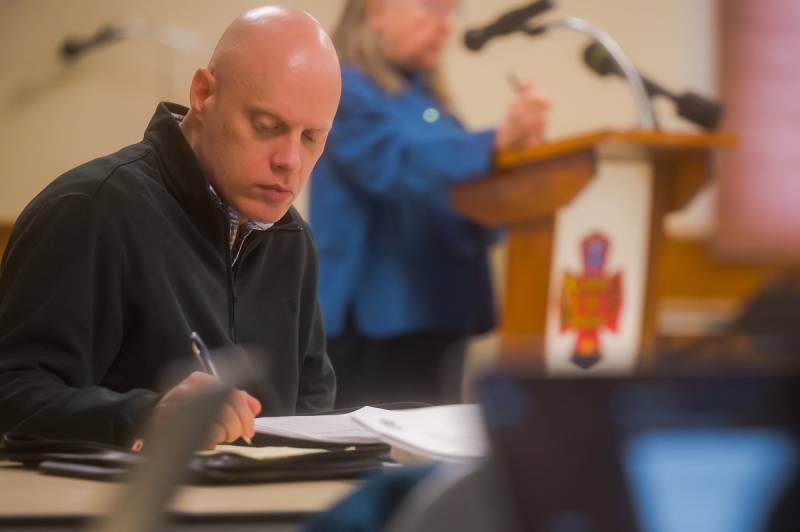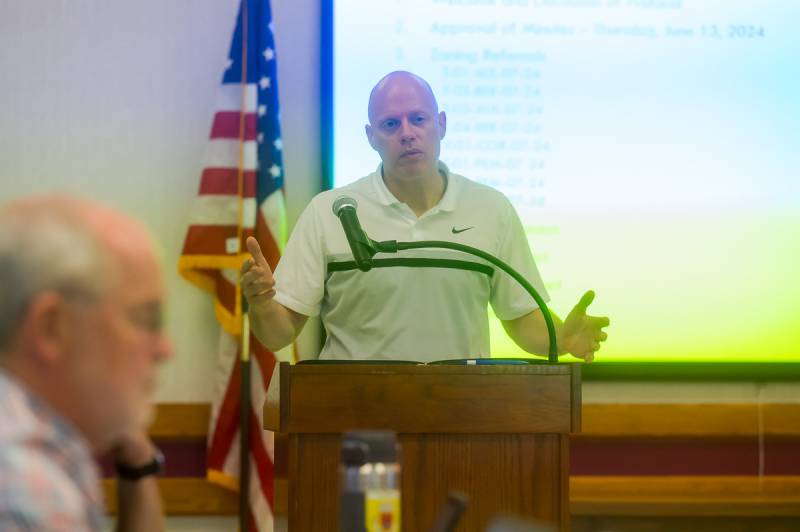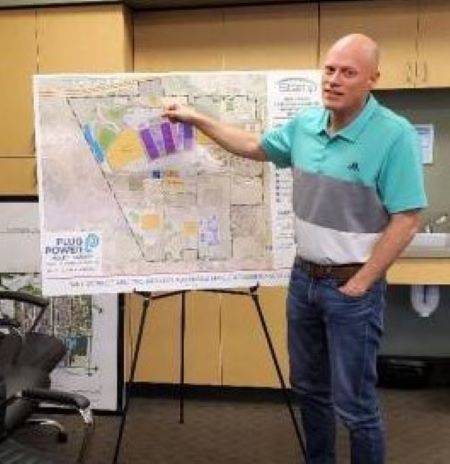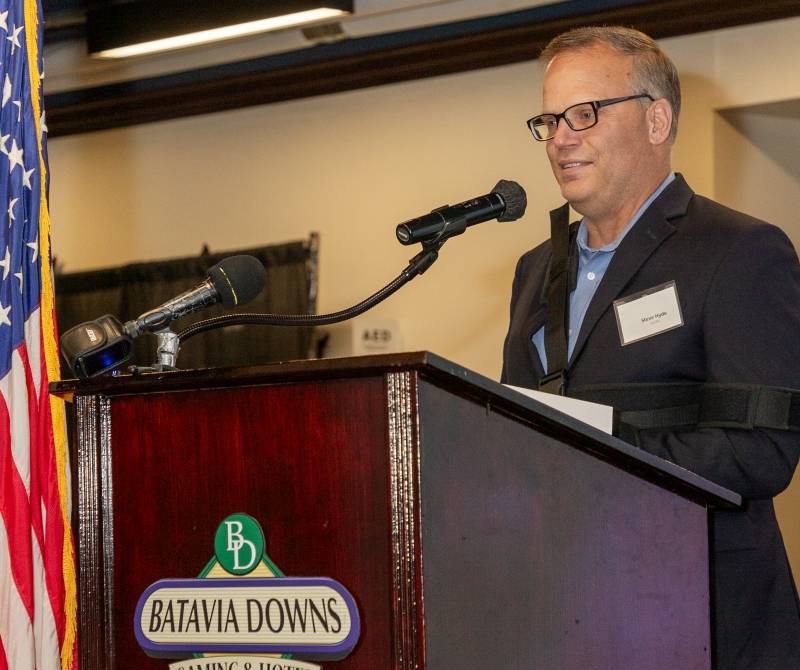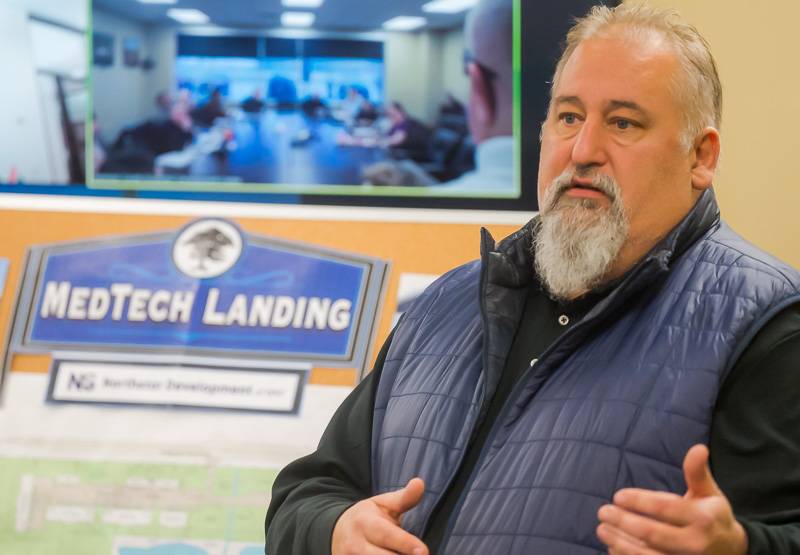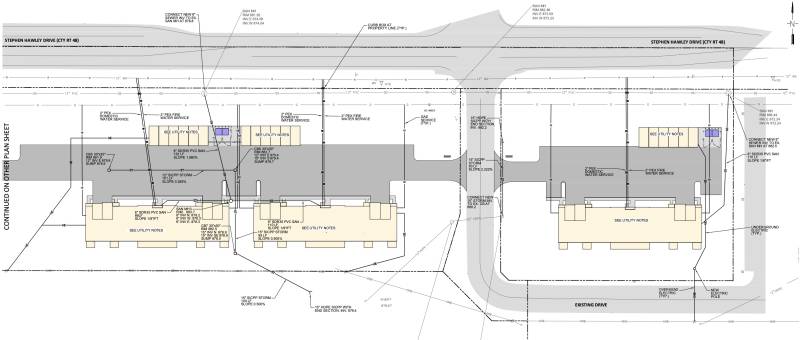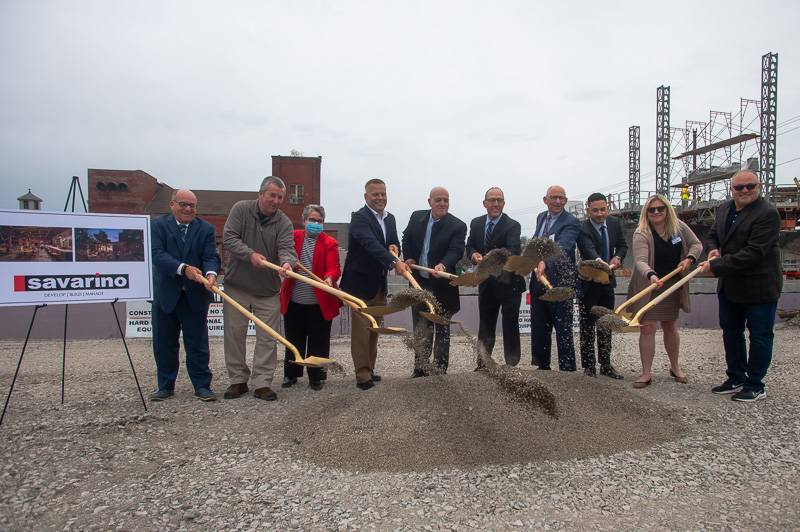GCEDC approves data center project that promises local jurisdictions $128M in revenue for next 25 years

Photo by Howard Owens.
As more than a dozen sign-holding activists opposed to the idea looked on, the board of the Genesee County Economic Development Center voted unanimously to approve an incentive agreement with Stream U.S. Data Centers, LLC for the company to build a massive $6.3 billion facility on 60 acres at WNY STAMP.
After the vote, one woman said repeatedly, "Shame on you. Shame on you for your vote."
Outside the conference room, as GCEDC CEO Mark Masse walked back to his office, she yelled, "Shame on you Mark Masse."
Pete Zeliff, chairman of the GCEDC board of directors, said he thinks such reactions are over-the-top and the people protesting the project are not well informed.
"They haven't chosen to read all the reports," Zeliff told The Batavian after the meeting.
He's gotten a lot of emails about the project and he read the report on the objections raised at a Feb. 3 public hearing, he said.
For example, addressing concerns about the amount of water being used by a data center project, he said, "20,000 gallons a day of water is for toilets, for waste, it's not cooling or anything like that."
The advantage of Stream, also known as project Double Reed, is that it will only use a handful of backup generators that will only be used as necessary, far fewer than the other proposed projects, so the emissions will be minimal, he said.
He said he supported the project because of the revenue it will bring to the three affected taxing jurisdictions -- the town of Alabama, Oakfield-Alabama School District, and Genesee County.
The three jurisdictions will split $7 million in the first year alone.
U.S. Data Center's winning bid promises to pay at least 105% of the taxable value of the property. Of the course of the 25-year PILOT agreement, it will pay $128 million in fees (after the PILOT, the property will be taxed at its assessed value).
Those fees will be important to Genesee County, County Manager Matt Landers said to The Batavian after the meeting. The county has been wrestling with how to pay for a water project.
"We are dedicating 100% of that revenue towards phase three of the water project, and that's a project that has a potential price tag of $150 million," Landers said. "Whenever we have an opportunity to capture some dedicated revenue for a project like that, we will take advantage of it. So that is definitely something that is positive coming out of this."
Landers and Zeliff also both like the job creation aspect. While the jobs per acre of the project might be fewer than another project might generate, these jobs will pay on an average $89,000 each.
"Any job that we create is great," Landers said. "I know, as a community, as a county, we have to work on getting more housing so we can take advantage of all these jobs that are coming here. Looking around our business parks, it's pretty impressive to see how many jobs they have been able to create over the years. The challenge now is to make sure we have some housing for those jobs. I believe over 100 jobs are being created. That is good to see. I look forward to hopefully the next projects having even more jobs."
The local economy needs those 122 jobs, especially at that pay scale, Zeliff said.
"That's way above normal in Genesee County, Zeliff said. "There were people at the meeting talking about how they want their children to be able to walk through the refuge but this project is not going to affect the refuge. This is a project where their children can get a job when they're old enough to get a job."
Zeliff said the board and staff have done its due diligence on this project and he believes all of the environmental concerns of the opponents have been addressed.
"I really don't see a negative with the project," Zeliff said. "It's not as many jobs per acre, but they're good, well-paying jobs for the county of Genesee."
At Wednesday's WNY STAMP Committee meeting, Masse made the case for Stream Data Centers.
The water district project was part of his pitch.
"This project will help the county cover the shortfall of the water project," Masse said. "It will help maintain rates for all Genesee County residents for water. It will help the health and welfare of all county residents through the water project."
He also said the project is in line with DEC regulations. The noise levels are within the standards set by the environmental review process in 2012. The project is allowed under the 2012 site plan. There is no discharge of heated water. It won't affect the reliability of the power grid nor lead to an increase in rates. It has low air emissions. And, no wetlands will be impacted by the project.
Masse said it also uses far less water than the other two proposed projects.
It was also the only project with an agreement with a Fortune 500 company to lease 100 percent of the data center once it's operational.
"Rampart had promised the highest PILOT payment for three projects, but community members made it clear that money should not be the only factor taken into consideration for this process," Masse said to the committee. "Our job was to determine which project was the best for the community and STAMP, and based on the information provided to us by the three projects, Project Double Reed will have the smallest environmental impact and will best address concerns expressed by the Nation with respect to visual and noise impacts and with respect to local benefits."
The case for Double Reed is also made in the resolution approving the project.
The resolution states:
The agency has determined that the two other competing proposals are not the most advantageous to the State, and that it would be in the public interest to reject the proposals submitted by Potentia Holdings, LLC (hereinafter referred to as "Project Hydroscale") and Project Rampart, LLC (hereinafter referred to as "Project Rampart"), respectively,''' because, among other things, those proposals" prospective profitability is speculative and implementing either proposal is anticipated to yield adverse environmental impacts discussed herein.
GCEDC staff also found the owners of Project Double Reed easier to work with, that the planners demonstrated the greatest "good faith" effort throughout the application process. Project Hydroscale kept changing its proposal, according to the resolution, even after the deadline for changes.
The troubling aspect of Project Rampart's team, the proposal states, is threats of litigation and "other bad behavior trying to manipulate the review of the application."
The resolution states, "Project Rampart’s actions throughout the application review process have indicated that Project Rampart would be unable to have a productive relationship with the Agency and other STAMP stakeholders."
The resolution also states, "Project Double Reed is pledging the highest capital investment at $6.3 billion, with Project Hydroscale at $5.4 billion, and Project Rampart at $3.3 billion."
Project Double Reed pledged an $18 million purchase price for the 60 acres it will acquire.
While the PILOT agreement for Stream U.S. Data Centers is unusual in that the company will pay more in fees than it would in property taxes without a PILOT, the company is receiving an abatement on sales taxes for construction and equipment not to exceed $462,560,000 based on the first $5,782,000,000 invested.
That sales tax incentive is about 7% of the first year in fees it will pay to local taxing jurisdictions.
It will also receive a $9 million break on the mortgage recording tax, which wouldn't be charged without the purchase of the property.
Previously:
- Dozens of speakers tell GCEDC proposed data centers pose big environmental threat for little economic gain
- Q&A: GCEDC CEO discusses environmental issues raised at data centers public hearing

Photo by Howard Owens.

